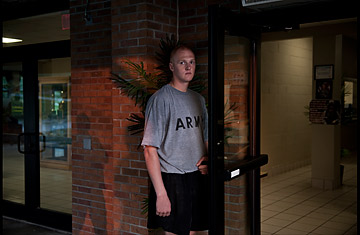
A recruit at Fort Jackson holds open the door to the mess hall during breakfast hours.
(4 of 8)
Even the sensitive matter of pay and benefits separates the troops from the rest of the nation. Though many Americans may assume the military is underpaid, the numbers tell a different story. Since 9/11, compensation has increased dramatically for those in uniform, with Congress heaping pay raises atop even those requested by Pentagon leaders year after year. Military compensation per service member has jumped from $56,738 in 1998 to $85,581 last year. It's a raise--on top of inflation--of 20%. Other benefits have jumped even higher: housing allowances (up 188%), bonuses (up 56%), retirement funding (up 24%). "You don't want a military that feels alienated, separated and martyred," says military historian Richard Kohn of the University of North Carolina at Chapel Hill. "That's one reason pay and benefits have been rising so dramatically."
A MORE DANGEROUS DIVIDE
On close inspection, it is clear that we're not only outsourcing our security to a smaller group of citizens; we're outsourcing some of it to noncitizens. Since 9/11, 70,000 foreigners have won American citizenship by joining the U.S. military; right now, about 16,000 noncitizens are on active duty, hoping it will earn them citizenship. U.S. officials expect that 9,000 more--roughly two Army brigades' worth--will sign up each year. The outsourcing of our common defense is even more pronounced when you calculate that for every soldier in Afghanistan, there is roughly one private contractor, working at taxpayer expense, providing meals and doing other chores.
Gates raised the issue of a military-civilian divide in a speech at Duke University last year and returned to it last month at West Point. On his final Afghan tour as Defense Secretary in June, Gates said a sergeant reported that "he and others had signed up because the military--in his case, the Marines--had a set of standards and values that is better than that of the civilian sector." Gates then noted that an Army exhibit displayed along a Pentagon corridor declares that the service embraces values--loyalty, respect and honor among them--that "distinguish American Soldiers from American society." Gates told the West Point cadets that "it is rather peculiar to suggest that attributes such as integrity, respect and courage are not valued in the United States of America writ large ... It is off-putting to hear, albeit anecdotally, comments that suggest that [the] military is to some degree separate and even superior from the society, the country, it is sworn to protect ... There is a risk over time of developing a cadre of military leaders that politically, culturally and geographically have less and less in common with the majority of the people they have sworn to defend," Gates said. "Getting this relationship on a sound footing is so important because a civil-military divide can expose itself in an ugly way, especially during a protracted and frustrating war effort."
